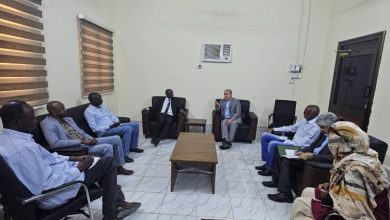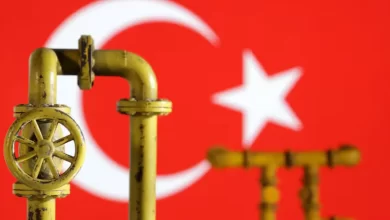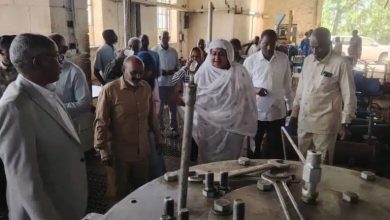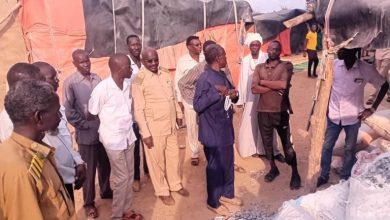Minister of Minerals, Muhammad Bashir Abu Nammu, in an interview with (Al-Ahdath): Production has exceeded 50 tons since the outbreak of war
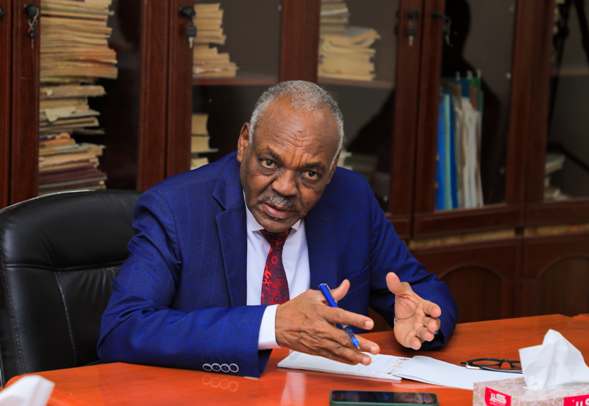
Dialogue – Nahid Oshi
The war that broke out on April 15, 2023 cast a negative shadow on all activities and sectors, as many important facilities were destroyed, while production stopped in conflict areas. However, the mining sector, which is considered one of the driving sectors of the economy, and despite being affected by the war and militia attacks, continued its production mission until the its toll exceeded 50 tons since the outbreak of war until the first quarter of the year 2024, Minister of Minerals Muhammad Bashir Abu Nammu resigned and came out with the following toll.
First, tell me about the ministry’s performance during the war and the efforts made?
The Ministry of Minerals was one of the first ministries that took the initiative to think and move towards Port Sudan as its headquarters to manage its work, on May 15, 2023, through an agile emergency committee, pursuant to Emergency Ministerial Decision No. (1), which stipulated the formation of an emergency committee of a small number of workers in the ministry, headed by the minister.
After the outbreak of war, all foreigners working in the mining sector were evacuated in coordination with the security services and relevant authorities so that the side would not be exposed to events and to maintain investment relations with foreign entities investing in the mining sector in Sudan.
Also, after the Ministry and its arms stabilized in Port Sudan and ensured the safety of the sites of companies located in the safe states, communication was made with all companies, including foreign companies that evacuated their workers, especially productive companies, and encouraged them to return to work. The Ministry also worked to take a number of administrative and technical packages to supervise and control all companies at all stages, supervising and organizing traditional mining, and converting a number of sites to small mining in order to maximize production and increase the state’s revenues from gold and other minerals, which led to maximizing production, which exceeded 50 tons since the outbreak of war until the first quarter of the year 2024.
What are the repercussions of the war that has lasted more than a year on the metals sector?
Minerals, like other economic sectors in the country, was affected by the repercussions of the current war due to the rebellion of the dissolved Rapid Support militia. At the beginning of the war, most of the foreign staff working in the companies left, which led to the cessation of all foreign companies at that time. In addition, the sector suffered from a scarcity of production inputs, especially those imported from abroad. In addition to the security concerns of investors.
More than 35 companies in the waste sector have stopped, about 130 concession companies have stopped in the exploration phase, 19 future concession companies have stopped production, and finally, with measures from the Ministry, about 5 producing concession companies have returned to production, and the Ministry is working hard to ensure that the rest of the producing companies return to work soon, in addition to the cessation of companies operating in Blue Nile State. All production, exploration and processing companies stopped mining waste in all states of Darfur and Kordofan. In addition, all mining markets in the states of Darfur and some markets in the states of Kordofan are out of control, and the Ministry is working hard to take control of some markets in the states of Kordofan and North Darfur, and now the collection and control of the product has begun in some of them.
In terms of infrastructure, the Ministry’s facilities were greatly affected, as the Ministry’s headquarters and the Geological Research Authority were completely burned, the headquarters of the Sudanese Mineral Resources Company, the Ariab Mining Company, the Sodamin Company and the Sudan Refinery were occupied, and the Ministry’s vehicles and arms were confiscated, which caused the Ministry to lose a large legacy of databases related to exploratory studies and research.
What is the cost of rebuilding the sector?
To restore the ministry to its pre-war state, it requires huge efforts and funds to reconstruct the headquarters and mobile assets and recover part of the information. The total cost is estimated at 4 billion dollars, but the largest and most important part of the information that was burned in the central library (the library of the General Authority for Geological Research) is difficult to obtain.
How will the sector contribute to the reconstruction of Sudan?
The mineral sector has been supplying the state treasury with foreign and local currencies throughout the previous periods, during the war period, and until the present moment, and it will contribute to reconstruction from several aspects, the financial aspect, which the Ministry of Minerals considers one of the most important economic sectors now, and also through the provision of building materials of various types, such as iron, cement, and marble and all other industrial minerals that are used in the manufacture of building materials, and Sudan is rich in these minerals in addition to gold.
Despite the circumstances the country is going through, gold exports exceeded $428 million during the first quarter alone. Tell us about the matter?
Yes, the Ministry of Minerals has taken a package of policies to protect the product and maximize revenues. The most important of these policies is providing production inputs by facilitating import and distribution procedures to companies, liberalizing the purchasing policy for buying gold, provided that any company that meets the conditions buys free gold and exports it without restrictions while adhering to the export proceeds.
The Ministry, in coordination with the Ministry of Finance, also dropped the fee for the product transfer form, which led to motivating producers and the demand towards the Ministry’s outlets to transfer gold with the free form to specifications and standards for calibration and then export.
The Ministry also implemented a package of incentive measures to return producing companies to work after a hiatus that lasted more than 5 months since the beginning of the war.
What are your expectations for metal exports by the end of 2024?
We expect that mineral export revenues, including gold, will reach $2 billion and may increase if more encouraging policies are taken by liberalizing export revenues or expanding the umbrella of the strategic commodity without stopping only the import of the commodity specified now.
The current economic situation is witnessing a noticeable deterioration, especially with regard to the Sudanese currency, which has declined against foreign currencies.
How do you see the contribution of mineral exports in curbing the momentum of the dollar and other currencies?
The minerals sector has been supplying the state treasury with local and foreign currencies throughout the periods from before the war until now. The Ministry of Minerals can contribute to curbing the economic deterioration and the rise of foreign currencies against the Sudanese pound through the proceeds of exports of gold and other minerals and also through the promotion of concession boxes for foreign companies in addition to the provisions of control on traditional mining, legalizing it, transforming it into organized mining, maximizing and collecting state shares, while encouraging, facilitating and assisting concessionary companies to increase their production, which increases the government’s share of the gold and other minerals produced.
How are mining operations going in the safe states, and are those areas operated by companies?
After the outbreak of war, all foreigners working in the mining sector were evacuated in coordination with the security services and relevant authorities so that foreigners would not be affected by the events and to maintain investment relations with foreign parties investing in the mining sector in Sudan. We are constantly monitoring the safety of the sites of companies located in the safe states, and communication has been made with All companies, including foreign companies, that evacuated their workers, especially productive companies, and encourage them to return.
To what extent are private mining and its workers affected by the stability witnessed in mining areas?
Traditional mining areas witnessed high activity during the previous period. This is due to the fact that the large states that were not affected by the war or affected by it led to an increase in the production of traditional mining markets, which appeared through the export earnings of free gold. According to preliminary statistics, there are about 2,000,000 miners working in activity of traditional mining in its various stages. Through this stability, miners moved from volatile areas to stable areas to work to raise production, and this appeared in the volume of production increasing daily since the outbreak of war. Despite the withdrawal of 6 states from service, traditional mining achieved the required level of 110%.
Are there gold-producing areas under the control of the Rapid Support Militia?
At the present time, there are no gold-producing areas under the control of the militia due to the frequent military airstrikes in the past in mining areas where the rebel Rapid Support Forces are located, especially in the western states. There are no statistics on the quantities seized by the militia, but it is certain that quantities of gold have been looted from The areas that the militia attacked will certainly be accurately identified after the end of the war, noting that there is a sovereign committee formed with membership in the Ministry of Minerals and Finance that works to manage and operate all companies belonging to the rebel Rapid Support.
What do you say about relations with Russia in the field of mining?
Relations with Russia, like other foreign investors in the mining sector, are based on mutual benefit between the two parties and are governed by agreements and charters.
Sudanese-Russian relations are considered very distinguished. There is a ministerial committee between the two parties, and the committee is headed by the Minister of Minerals from the Sudanese side. It is interested in all activities and projects in all fields, the most important of which are minerals. There is very great coordination with the Russian side, noting that the first mining company to resume work is Alliance Company, which is one of the large producing franchise companies in Sudan, and currently the relationship is very special, especially after the visit of the Minister of Finance to Russia to attract more Russian investments in Sudan. We aspire to more joint cooperation. Several meetings were held with the Russian ambassador to solve all the problems of Russian companies in Sudan, and we are heading towards a major openness with the State of Russia. Now the state participates in many forums and there are mutual visits thereafter.
Some states complain about the impact of domestic mining on the environment. What are the Ministry’s steps to reduce the damage resulting from this matter?
There are ongoing efforts to reduce the effects of traditional mining activity with the increasing numbers in the activity, and the negative effects lie in the use of chemicals in mining activity, the work of mixers, and the use of thiourea.
As for the use of mercury, there is control in the Ministry by installing capacitors in all waste treatment companies to get rid of and collect mercury.
With the spread of mixers in the recent period and the use of thiourea, which is very harmful to the environment and human health, we issued decisions to ban mixers and ban thiourea, and to conduct monitoring and awareness campaigns for the states of the Nile River, the North, and the Red Sea. This led to the issuance of state orders from the governors, which helped greatly in preventing mixers and the use of thiourea, in cooperation with the states, the Supreme Council for the Environment, the Sudanese Mineral Resources Company, and the Sodamine Company. During the coming period, we will carry out other campaigns to remove mixers and confiscate chemicals in unregulated markets.
There are voices calling for merging the Ministry of Minerals with the Ministry of Oil, and others who believe in the necessity of keeping minerals as an independent ministry. What is your comment?
Before the year 2010, minerals were integrated with energy under the name of energy and mining, and in the year 2010 the first separate ministry for minerals was established in the modern history of Sudan, i.e. after independence, headed by Dr. Abdul Baqi Al-Jilani. In the year 2018, for reasons of austerity, it was merged with Energy and Electricity and headed by the geologist, Counselor Azhari Abdel Qader. In the year 2019, with the correction decisions, the minerals were returned to a separate ministry headed by Dr. Muhammad Abu Fatima. Then the government returned to merging the ministry again with Oil and Electricity under the revolutionary government under the name of the agile government, headed by the geologist Counselor/ Adel Ali Ibrahim, but by the year 2020 amendments were made as a result of which the Ministry of Minerals returned as a separate ministry.
These are six fluctuations of the Ministry between individuals and mergers, five of which took place within six years in different eras with different decisions, that is, a decision for each year.
In my opinion, this is due to two things. The first is that the committees that work on sorting and merging do not have a clear picture of the composition of the state’s bodies and what each ministry can contribute.
Secondly, stakeholders and the departments of specialized institutions for each sector are not accompanied in these deliberations, so the standards are always inadequate and the results are delayed and not advanced. The evidence is that with every merger, the specialized technical authorities from the ministry make a great effort in explaining the reality of the situation, so the ministry is sorted out with the first upcoming ministerial reshuffle.
The question is why should the Ministry of Minerals be separate?
First: In a short life, minerals with only one mineral were able to top the list of Sudan’s exports and became the source of its largest free currency, let alone dozens of other minerals on the list, in addition to many companies that should be established on the same basis as the Sudanese Mineral Resources Company, Ariab Company, and the Sudanese Minerals Training Company were founded.
Secondly: Our country is in a state of war, or let us say that it is emerging from a state of war that is exhausting and devastating to the infrastructure, let alone major sectors that before the war basically represented a major challenge, such as oil and electricity, and minerals are combined with them. These are files of complexity that need to be constantly presented in senior meetings, and their issues must be present, except at the level of the Council of Ministers or the Sovereignty Council, what would a minister say who only has a few minutes at the sovereign level to express three files, each of which requires a full-time Council of Ministers to support them with sovereign decisions.
Third: The minister’s specialization will often determine his priorities, whether he is interested in oil, electricity, or minerals, and therefore his presence and current concerns will mostly be in a field that he understands directly and his information is present, and he will need a long time to understand the issues of other sectors. On the contrary, in the case of a single ministry, even if the minister is not specialized, he will devote His time, effort, solution, and travel towards his responsibility, so he sleeps and wakes up with it.
Fourth: It is clear that the state agencies, in their various reviews, discover the error of merging minerals with other sectors and quickly correct this error by returning minerals to an independent ministry. This matter, although positive, greatly delayed the development and growth of the Ministry of Minerals, weakened the presence of its issues at the level of the sovereign body, and decreased information on the level of the highest state agencies.
My opinion and opinion is that a ministry directly pumps no less than $350 million annually into the state budget, supervises no less than 50% of the value of the country’s exports, and manages operating budgets for companies and miners within the state’s economic cycle amounting to no less than $2 billion annually, and a ministry that takes responsibility for more than six millions of Sudanese workers, traders, miners, and their dependents, and a ministry that represents a miniature economy of the country with all the capital, major businessmen, and companies inside it.
My opinion is that a ministry with such a challenge and in which everyone aspires to lead the way through the ages should be separate.
